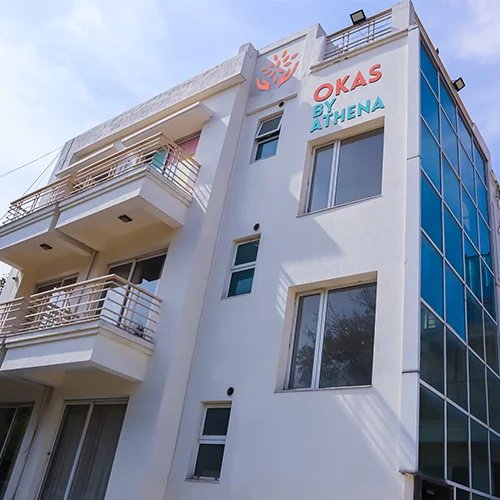Best Rehab Center in India
Top Luxury Deaddiction & Mental Health Treatment

The Best Rehab Center in India
When life feels overwhelming and burdens become too heavy, there is hope and healing available at the best rehab center in India. At Athena Behavioral Health, we provide internationally recognized treatment programs tailored to each individual’s needs. As a leading rehabilitation centre in India, we are committed to clinical excellence, compassionate care, and unwavering support to help individuals rebuild their lives.
More than just a treatment facility, Athena is a safe, nurturing residential rehab center in India where healing begins, growth is supported, and brighter futures are built.
Contact usWhy Choose Rehab Center in India for Recovery?

Unmatched Expertise
As one of the top rehab centers in India, Athena Behavioral Health offers evidence-based therapies delivered by experienced professionals. Whether you're seeking treatment for addiction, mental health issues, or physical rehabilitation, our rehab center in India is equipped to support your recovery journey with integrity and care.

Tailored Recovery Programs
Recovery is a deeply personal experience. At our luxury rehab centre in India, we develop customized programs for every individual. This personalized care is what makes us one of the best rehab centres in India, ensuring that each client receives focused, effective support.

Luxurious Healing Environment
Athena Behavioral Health blends advanced medical infrastructure with serene surroundings. Recognized among the top luxury rehab centres in India, Athena Behavioral Heath's environment promotes focused healing, privacy, and peace, making it ideal for recovery.
Our Team

Dr. Ashish Mittal
Chief Medical Officer
(AIIMS - New Delhi)

Dr. Rahul Rai
Clinical Director
Consultant Psychiatrist

Dr. Namit Gautam
Consultant Psychiatrist
(ABVIMS & DR RML HOSPITAL - New Delhi)

Dr. Namrata Kumari
Consultant Psychiatrist
(AIIMS - Rishikesh)

Dr. Pranavi Gupta
Consultant Psychiatrist
(Government Medical College - Jammu)

Dr. Shakshi Chaudhary
Consultant Psychiatrist

Heena Oberoi
RCI-Licensed- Clinical Psychologist

Nikita Gaba
RCI-Licensed- Clinical Psychologist

Shreeyam Mishra
RCI-Licensed- Clinical Psychologist

Aditi Saxena
RCI-Licensed- Clinical Psychologist

Sahebanna Doddamani
Asst. Clinical Psychologist
Our Top Rehab Centers in India
120+
Trained Staff
15000+
Happy & Recovered Patients
4+
Locations
100+
Beds Available
Book Appointment
What Keeps Us Different?
Authentic Rehabilitation Center
- As a trusted and genuine rehabilitation centre in India, we emphasize ethical practice and patient-centered approaches.
- Rehab centre in India will definitely focus on ethical practices as well as patient-centered care.
Privately Run Excellence
- Experience unmatched quality at one of the best privately run rehab centers in India.
- Where our focus lies in individualized care as well as long-term recovery.
Nationwide Recognition
- Consistently ranked among the top 10 rehabilitation centers in India.
- Widely regarded as the best rehabilitation center in India by those seeking real, sustainable healing.
Your Recovery Begins at the Best Rehabilitation Center in India
We believe that recovery is best undertaken together. At best rehab center in India, our team of dedicated professionals, luxurious facilities, and evidence-based programs make us the top rehab center in India for people seeking real change.
Whether you're looking for the best psychiatric rehab centre in India, a mental health rehabilitation centre in India, or a dedicated deaddiction center in India, Athena Behavioral Health is your partner in transformation.
.jpg)
.png)
.png)
.png)
Specialized Services at Our Top Rehab Center
Addiction is a complex condition that affects both the mind and body, compelling individuals to repeatedly engage in certain behaviors or consume substances despite negative consequences. At our India's rehabilitation center, Our best psychiatrist provide treatment and support for a wide range of addictions, recognizing that each type requires specialized care and a tailored approach to recovery. Below, we explore some of the most common types of addiction and how they impact individuals' lives.
De-Addiction Rehabilitation
As a leading drug rehab centre in India and alcohol rehabilitation centre in India, we provide holistic, multi-dimensional programs for substance use disorders. Our approach supports recovery on all levels—mental, emotional, and physical.
Mental Health and Psychiatric Rehabilitation
Athena stands out as the best psychiatric rehab centre in India, offering expert care for depression, anxiety, trauma, and other mental health challenges. As a trusted mental health rehabilitation centre in India, we provide a compassionate, stigma-free space for healing.
Women's Rehabilitation Centre
Our women's rehabilitation centre in India delivers gender-sensitive care in a safe, empowering environment. We address the unique challenges women face in recovery and help them regain strength and independence.








